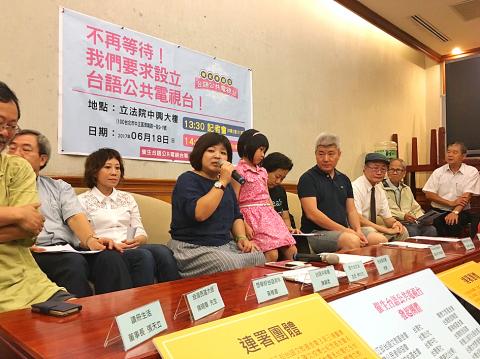A coalition of civic groups yesterday urged the government to establish a Hoklo-language (also known as Taiwanese) public television station to promote local culture and native language instruction.
Thirty-four groups led by the Taiwan Citizen Participation Association and the Taiwan Society called on the government not to ignore repeated calls for a station dedicated to Hoklo language and culture.
Although Hoklo is spoken by the majority of Taiwanese, the dominant media language is Mandarin, which hinders the development of Hoklo, Hakka and Aboriginal languages, the groups said.

Photo: Yang Chun-hui, Taipei Times
While it is legitimate to prioritize the preservation of Hakka and Aboriginal languages with specialized media, the nation is gradually losing its Hoklo heritage and the language should also be protected, they said.
Although Hoklo is spoken by 81.9 percent of Taiwanese, there are no laws, independent government agency or television station dedicated to the language’s development, association chairman Ho Tsung-hsun (何宗勳) said.
Taiwanese who speak Aboriginal languages account for 1.4 percent of the total population, and their languages are protected by the Aboriginal Language Development Act (原住民族語言發展法), the Council of Indigenous Peoples and Taiwan Indigenous TV, Ho said.
Hakka-speaking Taiwanese account for 6.6 percent of the population, and their culture is promoted by the Hakka Basic Act (客家基本法), the Hakka Affairs Council and Hakka TV, he added.
“Former minister of culture Lung Ying-tai (龍應台) under the Chinese Nationalist Party [KMT] administration expressed a vision for a Hoklo-language station. Why does the Democratic Progressive Party government not dare to say the same?” singer Chen Ming-chang (陳明章) said.
“Laws or budgets are not the problem — the problem is a [lack of] resolve,” Chen said.
Minister of Culture Cheng Li-chiun (鄭麗君) had announced that a Hoklo-language radio station would be established.
However, she has not made any clear statement responding to calls for the establishment of a Hoklo TV station, Chen said, criticizing the government’s passivity over the issue.
Taiwan Society vice president Tiunn Hok-chu (張復聚), who is also a physician, said many patients can only speak Hoklo, and doctors should speak to patients in their native languages to ensure high-quality communication and treatment.
Taiwanese below the age of 40 can usually understand Hoklo, but do not speak the language, and it is feared that later generations would not even be able to understand it, he said.
“We are all culpable if our native language disappears after 30 years,” Tiunn said.

Taiwan is to commence mass production of the Tien Kung (天弓, “Sky Bow”) III, IV and V missiles by the second quarter of this year if the legislature approves the government’s NT$1.25 trillion (US$39.78 billion) special defense budget, an official said yesterday. Commenting on condition of anonymity, a defense official with knowledge of the matter said that the advanced systems are expected to provide crucial capabilities against ballistic and cruise missiles for the proposed “T-Dome,” an advanced, multi-layered air defense network. The Tien Kung III is an air defense missile with a maximum interception altitude of 35km. The Tien Kung IV and V

The disruption of 941 flights in and out of Taiwan due to China’s large-scale military exercises was no accident, but rather the result of a “quasi-blockade” used to simulate creating the air and sea routes needed for an amphibious landing, a military expert said. The disruptions occurred on Tuesday and lasted about 10 hours as China conducted live-fire drills in the Taiwan Strait. The Civil Aviation Administration (CAA) said the exercises affected 857 international flights and 84 domestic flights, affecting more than 100,000 travelers. Su Tzu-yun (蘇紫雲), a research fellow at the government-sponsored Institute for National Defense and Security Research, said the air

Taiwan lacks effective and cost-efficient armaments to intercept rockets, making the planned “T-Dome” interception system necessary, two experts said on Tuesday. The concerns were raised after China’s military fired two waves of rockets during live-fire drills around Taiwan on Tuesday, part of two-day exercises code-named “Justice Mission 2025.” The first wave involved 17 rockets launched at 9am from Pingtan in China’s Fujian Province, according to Lieutenant General Hsieh Jih-sheng (謝日升) of the Office of the Deputy Chief of the General Staff for Intelligence at the Ministry of National Defense. Those rockets landed 70 nautical miles (129.6km) northeast of Keelung without flying over Taiwan,

City buses in Taipei and New Taipei City, as well as the Taipei MRT, would on Saturday begin accepting QR code payments from five electronic payment providers, the Taipei Department of Transportation said yesterday. The new option would allow passengers to use the “transportation QR code” feature from EasyWallet, iPass Money, iCash Pay, Jkopay or PXPay Plus. Passengers should open their preferred electronic payment app, select the “transportation code” — not the regular payment code — unlock it, and scan the code at ticket readers or gates, General Planning Division Director-General Liu Kuo-chu (劉國著) said. People should move through the